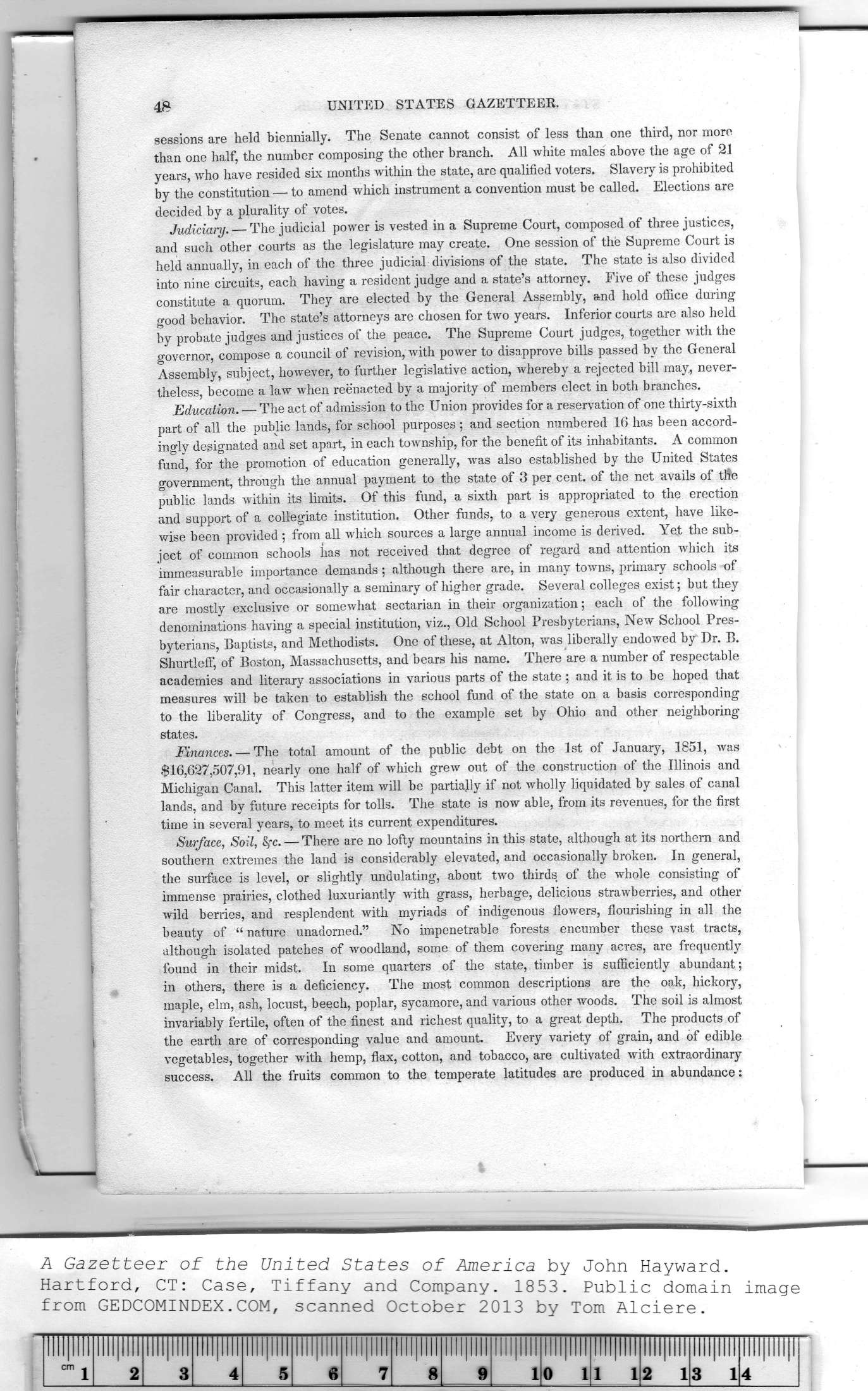|
|
Note: Ctrl and + increases the font size of the text below, Ctrl and - decreases it, and Ctrl and 0 resets it to default size.
48 UNITED STATES GAZETTEER.
sessions are held biennially. The Senate cannot consist of less than one third, nor more
than one half, the number composing the other branch. All white males above the age of 21
years, who have resided six months within the state, are qualified voters. Slavery is prohibited
by the constitution — to amend which instrument a convention must be called. Elections are
decided by a plurality of votes.
Judiciary. — The judicial power is vested in a Supreme Court, composed of three justices,
and such other courts as the legislature may create. One session of the Supreme Court is
held annually, in each of the three judicial divisions of the state. The state is also divided
into nine circuits, each having a resident judge and a state's attorney. Five of these judges
constitute a quorum. They are elected by the General Assembly, and hold office during
good behavior. The state's attorneys are chosen for two years. Inferior courts are also held
by probate judges and justices of the peace. The Supreme Court judges, together with the
governor, compose a council of revision, with power to disapprove bills passed by the General
Assembly, subject, however, to further legislative action, whereby a rejected bill may, never-
theless, become a law when reenacted by a majority of members elect in both branches.
Education. — The act of admission to the Union provides for a reservation of one thirty-sixth
part of all the public lands, for school purposes ; and section numbered 16 has been accord-
ingly designated and set apart, in each township, for the benefit of its inhabitants. A common
fund, for the promotion of education generally, was also established by the United States
government, through the annual payment to the state of 3 per cent, of the net avails of the
public lands within its limits. Of this fund, a sixth part is appropriated to the erection
and support of a collegiate institution. Other funds, to a very generous extent, have like-
wise been provided; from all which sources a large annual income is derived. Yet the sub-
ject of common schools has not received that degree of regard and attention which its
immeasurable importance demands ; although there are, in many towns, primary schools of
fair character, and occasionally a seminary of higher grade. Several colleges exist; but they
are mostly exclusive or somewhat sectarian in their organization; each of the following
denominations having a special institution, viz., Old School Presbyterians, New School Pres-
byterians, Baptists, and Methodists. One of these, at Alton, was liberally endowed by Dr. B.
Shurtleff, of Boston, Massachusetts, and bears his name. There are a number of respectable
academies and literary associations in various parts of the state ; and it is to be hoped that
measures will be taken to establish the school fund of the state on a basis corresponding
to the liberality of Congress, and to the example set by Ohio and other neighboring
states.
Finances. — The total amount of the public debt on the 1st of January, 1851, was
$16,627,507,91, nearly one half of which grew out of the construction of the Illinois and
Michigan Canal. This latter item will be partially if not wholly liquidated by sales of canal
lands, and by future receipts for tolls. The state is now able, from its revenues, for the first
time in several years, to meet its current expenditures.
Surface, Soil, fyc. — There are no lofty mountains in this state, although at its northern and
southern extremes the land is considerably elevated, and occasionally broken. In general,
the surface is level, or slightly undulating, about two thirds of the whole consisting of
immense prairies, clothed luxuriantly with grass, herbage, delicious strawberries, and other
wild berries, and resplendent with myriads of indigenous flowers, flourishing in all the
beauty of “ nature unadorned." No impenetrable forests encumber these vast tracts,
although isolated patches of woodland, some of them covering many acres, are frequently
found in their midst. In some quarters of the state, timber is sufficiently abundant;
in others, there is a deficiency. The most common descriptions are the oak, hickory,
maple, elm, ash, locust, beech, poplar, sycamore, and various other woods. The soil is almost
invariably fertile, often of the finest and richest quality, to a great depth. The products of
the earth are of corresponding value and amount. Every variety of grain, and of edible
vegetables, together with hemp, flax, cotton, and tobacco, are cultivated with extraordinary
success. All the fruits common to the temperate latitudes are produced in abundance:
|
Illllllll |
Illllllll |
Illllllll |
Illllllll |
Illllllll |
llll|llll |
llll llll |
Illllllll |
Illllllll |
llll|llll |
Illllllll |
Illllllll |
Illllllll |
Illllllll |
llll|!lll|l |
|
cm j |
2 |
3 |
4 |
5 |
6 |
7 |
8 |
9 |
1 |
0 1 |
1 1 |
2 1 |
3 1 |
4 |
|
